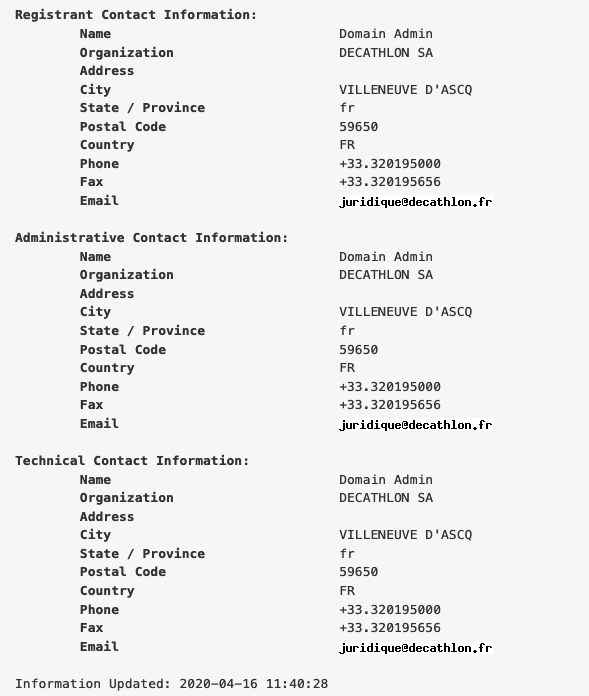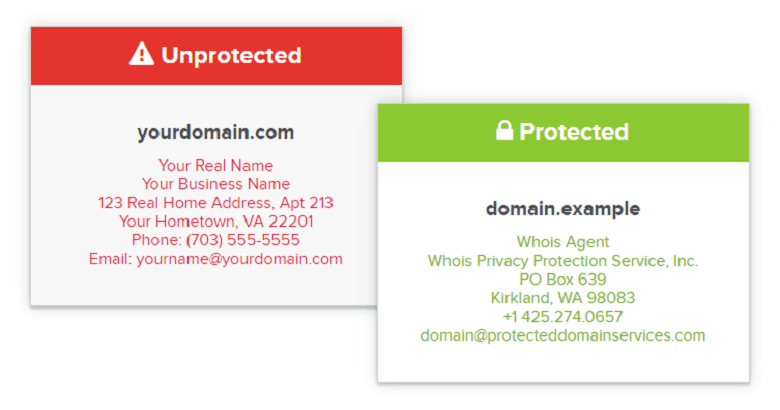Table of contents of the article:
In the digital age we live in, privacy is a topic of paramount importance. In recent years, both companies and individuals are increasingly realizing the importance of protecting personal data. However, in trying to keep sensitive data private, companies can easily make mistakes that affect their reputation, transparency and trustworthiness. These errors can therefore negatively reflect on the sales and overall success of an online business. A notable example of this is the incorrect use of the Whois service.
The need for Whois
Whois, a query-and-response protocol that is widely used to query public databases of domain name ownership information, plays a key role in the structure of the internet's infrastructure. The Whois service is a vital resource that provides a set of key details about a specific domain, accessible to anyone on the web.
In technical terms, the information provided by the Whois service includes various types of data about the domain, its owner and the current status of the domain. For starters, the service reveals the domain registration date, which indicates when the domain name was initially registered. This date is often used to evaluate the longevity and history of a website.
Take the Decathlon whois result for example.

The Whois service also provides the date the domain record was last updated. This information can be useful in determining whether the domain is actively managed or not. A site that hasn't seen recent updates to its Whois record may raise questions about its active management.
Another key element provided by the Whois service is the domain expiration date. This date can indicate whether the site owner intends to keep the site up and running for the long term. If the expiration date is far away, it is likely that the site will continue to be maintained and updated.
The Whois service also detects the identity of the registrar, the entity that registered the domain on behalf of the owner. This information can be revealing in terms of accountability and trustworthiness, as some registrars are more respected than others in the industry.
Finally, Whois reveals the domain owner's contact information, which can include their name, physical address, email address, and phone number. This data can be crucial in establishing a line of communication with the site owner, both for troubleshooting purposes and for legal matters.
The Whois service is therefore a fundamental element to ensure transparency on the Internet if the owner wants to be transparent.
Privacy and Whois: Benefits of data masking
The public nature of the information contained in Whois records has given rise to numerous privacy concerns, especially as detailed personal data is exposed to anyone with access to the Internet. In the face of these concerns, data obfuscation practices have become increasingly common to protect the personal information of domain owners.
Data masking, also known as “Whois Privacy”, “Private Registration” or “Privacy Shield”, is a technique used to hide the personal information of the domain owner. This practice replaces the domain owner's contact information with information from a privacy service or intermediary, providing an effective layer of protection for sensitive data.

Technically, data masking can prevent a number of security problems. First, it can help limit the amount of spam the domain owner receives. Since spammers often harvest email addresses from public Whois records, masking contact information can significantly reduce the amount of spam you receive.
Additionally, data masking can protect the domain owner from potential social engineering attacks. Attackers can use personal information found in Whois records to create targeted attacks, such as phishing scams, that exploit the victim's trust. By hiding this information, you reduce the chance that these tactics will be successful.
Finally, data masking can protect domain owners from identity-based attacks. Information such as full name, physical address and telephone number can be used to steal a person's identity. By obfuscating this information, domain owners can reduce the risk of identity theft.
However, it's important to note that while data masking can offer greater privacy protection, it can also lead to reduced transparency. This trade-off is a critical aspect of domain management that businesses need to consider when deciding how to manage their Whois records.
When privacy becomes an issue: the dark side of Whois data obfuscation
Despite the undisputed virtues of Whois data masking for privacy protection, there are circumstances where it can backfire for a business, particularly in the e-commerce sector. The problem arises when privacy becomes synonymous with obscurity, arousing suspicion and doubt in the minds of potential customers.
Imagine a consumer who plans to make a significant purchase on an e-commerce site that they are unfamiliar with or have only recently heard of. In an era where online fraud is on the rise, it is entirely plausible that the consumer would want to verify the site's authenticity and credibility before making such a large purchase.
In this scenario, the Whois service becomes an essential tool for the consumer to make sure that the company is legitimate. However, if the information in Whois has been redacted, this can raise consumer concerns. In particular, suspicions may arise that the company is trying to hide something or that it is not completely reliable. This lack of transparency can lead to a loss of trust and ultimately a renunciation of the purchase.
On a technical level, obfuscating Whois data may seem like a good practice, as it protects the personal information of domain owners. However, from a consumer perspective, this very practice can seem suspicious and potentially off-putting.

This implies a delicate balance between privacy and transparency that companies must manage. In the desire to protect privacy, companies must also consider how lack of information can affect consumer perception of their brand.
Psychologically, uncertainty and darkness can create a sense of fear or suspicion. This can lead to a loss of trust in the company and, consequently, a decrease in sales. In a context where consumers are increasingly aware of and wary of online scams, transparency can become a key factor in purchasing decisions. Therefore, companies need to think carefully before deciding to obfuscate their Whois data.
Conclusion: Find the balance between privacy and transparency
In conclusion, privacy is of paramount importance in today's digital world. However, for companies and professionals who operate online, it is essential not to overlook the value of transparency. Companies must try to establish a relationship of trust with customers and potential customers, and transparency can play a decisive role in this regard. Therefore, a balance must be sought between protecting sensitive data and disclosing sufficient information to prove one's legitimacy and reliability.
Total obfuscation of Whois data might seem like a good strategy to protect privacy, but it can unintentionally cast a shadow of doubt on a company's legitimacy and trustworthiness. It is therefore not always the most suitable solution for companies that aim to convey an image of reliability and transparency.
Instead, companies might consider using alternative approaches to protect privacy. For example, they may use business email addresses and dedicated phone numbers for domain registration. These can offer a level of protection without compromising the perception of transparency. Another option might be to provide only necessary business information, rather than personal details, in the Whois registry.
It is vital to remember that effective privacy management should never be at the expense of a company's reputation or ability to do business. Conversely, careful and considered privacy management can actually improve customer trust and, consequently, enhance the success of an e-commerce business. Therefore, companies are strongly advised to disable total masking of Whois data and always try to ensure maximum data transparency and availability.
